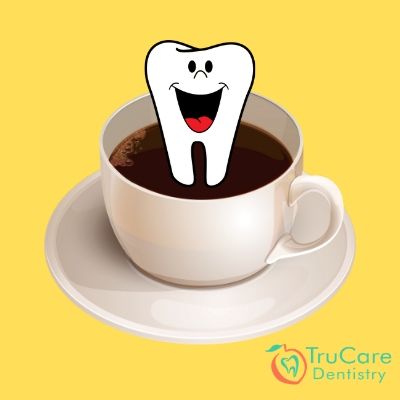
Millions of people prefer to rely on a cup of coffee to kick-start their day. Around 400 cups of coffee are consumed in the United States daily. However, this morning routine can negatively impact an individual’s dental health. Remember, if the coffee can stain your clothes, then it can do the same to your teeth.
A cup of coffee can result in stained teeth
Polyphenols like tannins present in the coffee are also found in tea, wine, and beverages. These ingredients combine with other compounds and stick to the teeth, resulting in a yellow hue. Thus, consuming even a single cup of coffee per day can result in yellow teeth.
Coffee also triggers the growth of harmful bacteria in the mouth that damage the enamel, making it brittle, thin.
For avoiding such stains and bad breath, dentists suggest coffee lovers should eat food before drinking coffee and use a toothbrush or a tongue scraper for removing the sticky compounds left behind after drinking coffee.
The link between coffee consumption and enamel erosion
There is no direct link between cavity formation and coffee consumption. However, it does manage to create a condition in the mouth that promotes the formation of cavities.
The outermost layer of the tooth is referred to as enamel. The cover protects the sensitive internal layers of the teeth. Consuming too much of sugary beverages, including coffee, can trigger enamel erosion. Once the enamel starts cracking, the tooth becomes sensitive and vulnerable to decay.
Dentists urge such patients to cut down their coffee consumption and use enamel-strengthening toothpaste for controlling any further damage to the enamel.
As per experts, eating a small piece of cheese after consuming a cup of coffee can help in neutralizing its adverse effects on enamel.
Is there any link between coffee and gum disease?
The periodontal infection affects the structure around the teeth. The initial stage of this disease is referred to as gingivitis, as it mostly affects the gums. Swollen, bleeding gums are signs of this medical condition. People often ignore the plaque buildup on the teeth, and it slowly spreads on the gum line, resulting in gingivitis. If ignored, the infection grows in the form of (bacteria) periodontal pockets that can destroy the tooth’s alveolar bone as well as connective tissue. The treatment for this condition involves cleaning gums, and surgically removing the periodontal pockets for controlling/getting rid of the subgingival microorganisms.
Coffee consumption has also been associated with endothelial dysfunction and an increase in inflammation. Several studies have already confirmed the link between periodontal disease and coffee intake. The one that remained in the headlines for several months was the Korea National Health and Nutrition Examination Survey, which included 7,299 male participants.
The researchers involved in the study pointed out that one of coffee’s main ingredients, caffeine, negatively impacts the bone healing process and can increase bone loss. Every cup of coffee contains 70–100 mg of caffeine. It can also result in the advancement of pathology in patients suffering from periodontitis.
The Korean team of researchers behind the study also recommended patients suffering from periodontal disease to reduce their coffee intake. Thus, the research established a clear link between coffee and gingivitis.
Coffee consumption and dry mouth
Individuals who drink a lot of coffee also suffer from dry mouth. Their teeth and gums remain more vulnerable to germs as the saliva flow gets negatively impacted due to caffeine.
Foods that offer health benefits can often have the potential to impact oral health negatively. A healthy balanced diet and practising good oral hygiene by brushing, flossing twice a day can help.
Caffeine addicts should also consider thoroughly rinsing the mouth with water after enjoying a cup of coffee.
Other side-effects
Every individual’s health may react to caffeine differently. Coffee can help in improving alertness, performance, and overall mental ability as it stimulates the central nervous system.
Physicians recommend coffee lovers to reduce the intake in case if the patient experiences sleeplessness, nervousness, or experience heart palpitations. Pregnant women need to be careful when it comes to consumption. Too much caffeine intake can result in a baby with lower birth weight or even a miscarriage as per the UK Food Standards Agency’s recommendation.
Unsweetened, strong, and black coffee can be a better alternative
There are health studies that highlight how moderate coffee consumption can help in fighting plaque and in protecting the teeth from decay. The findings, methods, and results for most of these studies are highly debatable subjects. Some of them also happen to be funded by NGOs associated with FMCG companies. The most crucial aspect worth noting is that most of the studies are focused on unsweetened, strong, and black coffee. Put simply, coffee without sugar, cream, or milk.
Starting your day with a mug of cappuccino in the morning can be okay. However, its addiction can prove to be harmful to overall health. Are you searching for a trustworthy dental office that offers gum disease treatment in Roswell? If so, you should surely fix an appointment at the TruCare Dentistry.
